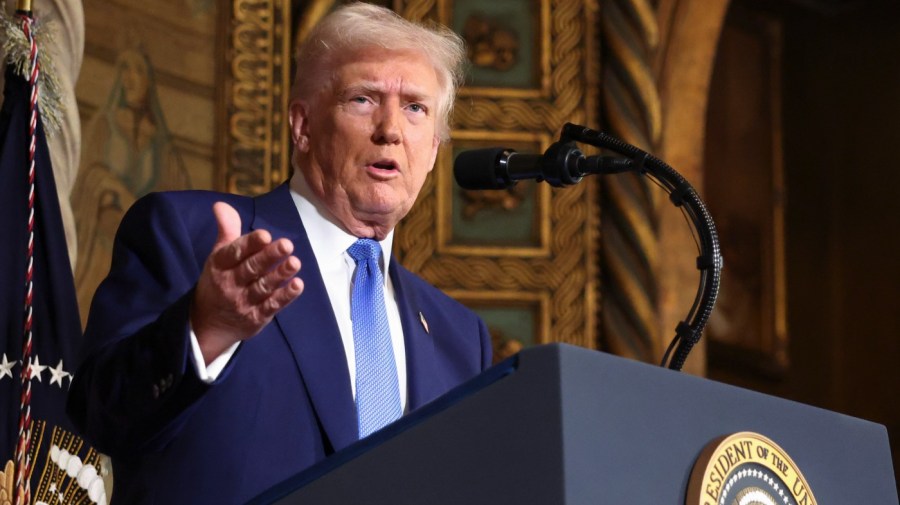President Trump’s vow to keep Medicaid intact is colliding headlong into the Republicans’ strategy to extend their 2017 tax cuts, complicating the GOP effort to secure a major policy win in the early months of Trump’s second term.
Trump on Wednesday endorsed the House Republicans’ plan to move “one big beautiful bill,” combining immigration and energy policies with $4.5 trillion in tax cuts. A large part of that cost, according to the GOP’s budget blueprint, would be offset by reductions in Medicaid spending.
Yet hours earlier, the president had vowed to preserve Medicare and Medicaid in their current form. Republicans, he suggested, would find the budget savings for the tax cuts elsewhere.
“Medicare, Medicaid — none of that stuff is going to be touched,” Trump said in a prime-time interview with Sean Hannity of Fox News. “We don’t have to.”
Trump’s promise clashes directly with the House GOP’s budget plan, which seeks as much as $880 billion in Medicaid cuts over the next decade. That figure is by far the biggest chunk of the $2 trillion in cuts Republicans are seeking across all federal programs to help pay for the loss of revenue from their proposed tax cuts. Those offsets are seen as crucial to the success of the larger legislative package because conservative deficit hawks — whose votes will be needed to move the bill through the House to Trump’s desk — are demanding that the legislation not add to the nation’s $36 trillion debt.
The GOP’s budget resolution is poised to hit the House floor next week. It would then fall to the Energy and Commerce Committee, which has jurisdiction over Medicaid, to determine precisely where the $880 billion in cuts would originate.
Trump’s hands-off approach to Medicaid has raised new questions about how GOP leaders will extend expensive tax cuts, without adding to the deficit, if their single largest offset provision is taken off the table.
It’s a question that some moderate Republicans — who fear the harm Medicaid cuts would have on their most vulnerable constituents — are also asking as they await the details of where those cuts will fall. Some are warning that their support for the final bill will hinge on those specifics.
“I literally don’t know yet,” said one moderate House Republican, who’s leery of the effect Medicaid cuts would have on low-income constituents. “I’m eager for them to present their plan [for] how to do so, and then I could provide the right scrutiny.
“If the inference is there’s no path to 880 without drastically hurting poor people, then the bill is dead.”
GOP leaders have dismissed the criticisms of their designs for Medicaid, which largely serves low-income Americans. Speaker Mike Johnson (R-La.) said last week that virtually all of the savings would come from two initiatives: an aggressive effort to eliminate waste, fraud and abuse in the program; and a move to expand work requirements for certain adult beneficiaries.
“Medicaid has never been on the chopping block,” Johnson told reporters in the Capitol. “What we’re talking about is finding the — it’s non-benefit-related reforms to the program.
“You know, work is good for you, you find dignity in work. And the people that are not doing that, we’re going to try to get their attention,” he added. “So everyone needs to take a deep sigh of relief and understand that we’re not going to harm any Americans with this.”
Democrats aren’t buying that argument, warning that Republicans, in their zeal to cut federal spending and extend Trump’s signature tax cuts to even the wealthiest Americans, have designs to slash safety net programs that will inevitably erode benefits for low- and working-class Americans. Medicaid — the country’s largest single insurance program, covering more than 72 million people, roughly half of them children — is at the top of the target list, Democrats say.
“The extreme MAGA Republican budget will close hospitals, shut down nursing homes and deprive children of healthcare,” House Minority Leader Hakeem Jeffries (D-N.Y.) said this week.
“There are 215 Democrats in the House who actually want to love and cherish Medicaid, not destroy it. We only need three House Republicans to join us.”
The Democrats’ role in the debate is limited because Republicans intend to move their tax package through an obscure process, known as reconciliation, empowering Republicans to pass the legislation through both chambers without any Democratic support.
Still, Democrats are fighting to ensure the process is optimally uncomfortable for Republicans, particularly vulnerable GOP lawmakers in battleground districts who could face a voter backlash if they support steep benefit cuts to social programs like Medicaid.
“More than half of patients in [New Jersey] nursing homes rely on Medicaid for care,” Rep. Josh Gottheimer (D-N.J.) posted on the social platform X. “Far-right extremists are trying to slash Medicaid funding and take away healthcare for our most vulnerable residents — we won’t let them.”
Trump, in his interview with Fox News, identified one area of cuts to Medicare and Medicaid that he’d support: the elimination of benefits for those immigrants living in the country illegally. The president has also suggested that his tax cut extension can be offset by new revenues generated from his aggressive tariff policies, while other GOP leaders are projecting enormous economic growth generated by the tax cuts.
Democrats have rejected those claims outright, warning that the GOP’s reconciliation package would pile trillions of dollars onto the debt, as the 2017 cuts had done.
“Clearly they can’t convince their own members to vote for it, and it’s understandable, because the revenue is not going to come from economic growth, like they’re projecting,” Rep. Jimmy Panetta (D-Calif.) said. “The revenue is not going to come from tariffs, as those add to inflation and bring the market and the economy down.
“So the only thing left is to add to our debt and deficit, and that means raising the debt ceiling. And they can’t even do that on their own.”
